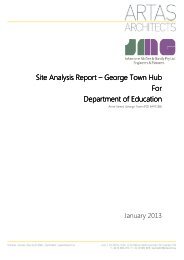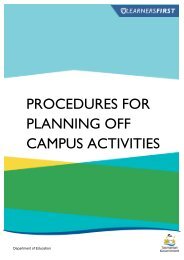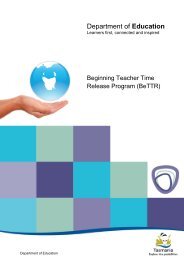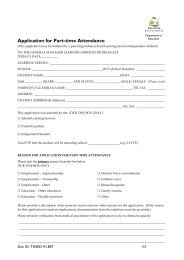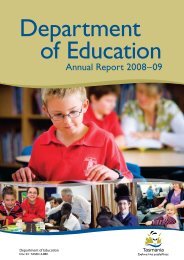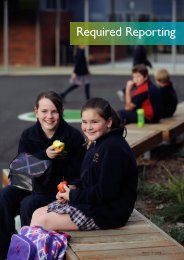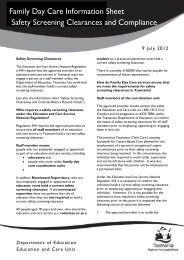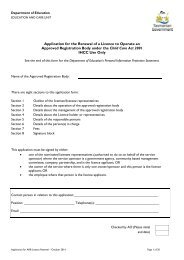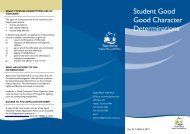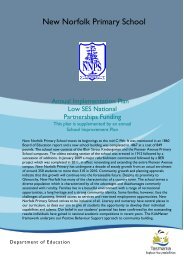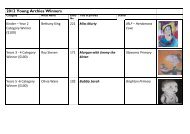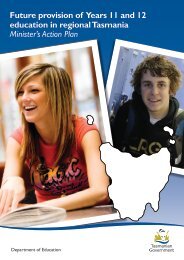Education
DoE Annual Report 2012-2013 - Department of Education
DoE Annual Report 2012-2013 - Department of Education
- No tags were found...
You also want an ePaper? Increase the reach of your titles
YUMPU automatically turns print PDFs into web optimized ePapers that Google loves.
Year 11 and<br />
12 <strong>Education</strong><br />
in Rural and<br />
Regional<br />
Areas<br />
The Department of <strong>Education</strong> is committed to providing<br />
high quality education and training to Year 11 and 12<br />
students in rural and regional areas that is aligned to<br />
employment opportunities, attainment of qualifications,<br />
or pathways to higher or further education.<br />
In 2012–13, the department continued to consult and<br />
work towards improving the provision and quality of<br />
education in rural and remote communities.<br />
Options for Year 11 and 12 students include:<br />
• enrolling on-campus in a senior secondary school for the<br />
full-range of academic, general and vocational courses<br />
• accessing the Flexible Learning Network (FLN) that<br />
allows courses to be delivered through a senior<br />
secondary school via distance education<br />
• a combination of traditional study on-campus and<br />
study by distance through the FLN to benefit from<br />
both options<br />
• accessing Year 11 and 12 programs through combined<br />
schools’ programs<br />
• enrolment through the Tasmanian eSchool, which<br />
provides learning in real-time regardless of the<br />
student’s geographic location<br />
• accessing VET through the Tasmanian Polytechnic,<br />
which provides services to most individual and<br />
combined schools’ programs and colleges<br />
• accessing industry aligned VET qualifications through<br />
the new and innovative trade training centres located<br />
in many rural and regional areas of Tasmania.<br />
Tasmanian<br />
Polytechnic<br />
The Tasmanian Polytechnic continued to focus its efforts on<br />
providing VET for adults, and in partnerships with senior<br />
secondary and combined schools—VET in Schools programs<br />
for young Tasmanians between 16 and 19 years of age.<br />
The Tasmanian Polytechnic enrolled 16,500 students<br />
during the 2012 academic year and this enrolment<br />
pattern has continued into 2013. Of these enrolments<br />
44% represent enrolments in qualifications at Certificate<br />
III or higher, 47% represent enrolments in qualifications<br />
at Certificate I or Certificate II and the balance are<br />
enrolments in programs that lead to a Statement of<br />
Attainment or are in a non-award course. These students<br />
were enrolled in over 300 qualifications and resulted in<br />
the delivery of 5.2 million student contact hours.<br />
During 2012, the Tasmanian Polytechnic issued 5,206<br />
qualifications, a figure that is comparable with achievements<br />
in 2011 and 2010. Over half of these qualifications (53.7%)<br />
were awarded at Certificate III or higher.<br />
Quality assurance of training delivery has been a key focus<br />
of the Tasmanian Polytechnic’s activities in 2012. This is<br />
evidenced by:<br />
• the continuing implementation of the partnership<br />
between the Tasmanian Polytechnic and the University<br />
of Tasmania (UTAS) that includes over 120 Tasmanian<br />
Polytechnic teachers enrolling in the Bachelor of<br />
<strong>Education</strong> (Applied Learning) Degree program<br />
offered by UTAS<br />
• the ongoing enthusiasm with which learning teams<br />
have engaged in the Tasmanian Polytechnic team<br />
quality profile management model for quality<br />
improvement<br />
• the completion by the due date (30 June 2013) of<br />
a project that ensured all Tasmanian Polytechnic<br />
teaching staff met the new quality standard of<br />
teaching qualifications required by the National Skills<br />
Standards Council.<br />
Further evidence of quality improvement within<br />
the Tasmanian Polytechnic is provided through a 2%<br />
improvement in the student satisfaction survey result in<br />
2012 when compared with 2011 – which was in turn a 3%<br />
improvement on the 2010 figure.<br />
The Tasmanian Polytechnic continued, during the 2012–13<br />
financial year, its focus on establishing a strong sustainable<br />
platform upon which future development could be<br />
based. This activity is evidenced through the significantly<br />
improved financial situation of the Tasmanian Polytechnic<br />
which, at the end of the 2012 academic year, reported a<br />
small surplus of revenue over expenditure. This focus has<br />
continued into 2013.<br />
Government<br />
<strong>Education</strong><br />
and Training<br />
International<br />
(GETI)<br />
GETI provides Tasmanian students with an enriching<br />
educational experience by attracting students from over<br />
46 countries to study in Tasmania for full-time school<br />
and vocational qualifications, short-term study abroad<br />
programs and English language courses.<br />
GETI also develops and manages the provision of<br />
Tasmanian Government education services to offshore<br />
students in a number of countries including China<br />
and Kuwait.<br />
International students bring cultural understanding,<br />
global connections and revenue to benefit our education<br />
institutions and the broader Tasmanian community.<br />
GETI’s strategic objectives are to increase international<br />
student enrolments in Tasmanian Government schools<br />
and TasTAFE.<br />
To achieve this objective, the following initiatives were<br />
implemented over 2012–13:<br />
• Several international student events to welcome and<br />
recognise our international students – sponsored by<br />
the Minister’s International <strong>Education</strong> Roundtable.<br />
• Manage Tasmania’s international education brand<br />
including a new student-focused website and updated<br />
recruitment materials focusing on the key benefits of<br />
studying in Tasmania.<br />
• A rewards-based incentive program for international<br />
education agents who provide more than 75% of<br />
international students to Tasmania.<br />
• Consolidating marketing and recruitment investment<br />
on key markets, based on statistical evidence and<br />
return on investment.<br />
• Continuing development of education programs<br />
including pathways between sectors to ensure<br />
Tasmania remains a viable option for international<br />
education as markets evolve.<br />
Post-Compulsory <strong>Education</strong> and Skills Development<br />
47



